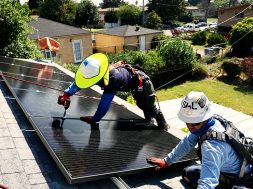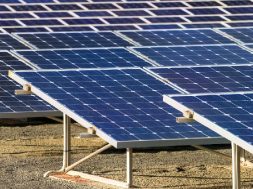
Waaree Energies sees sun rising on flexible solar modules business; expects 70% growth in FY19
MUMBAI: After nearly three years of wait, solar manufacturer Waaree Energies is gearing to step up its manufacturing of specialised flexible solar PV modules for niche applications as the market has finally picked up, Sunil Rathi, Director, Waaree Energies, told BusinessLine.
Warree partnered with Silicon Valley-based start-up Merlin Solar (acquired by Filipino conglomerate Ayala Group earlier this year) to manufacture flexible modules under Merlin’s patented technology back in 2014, but has so far been relying on exports to the US and other markets.
“Exports so far accounted for up to 60 per cent of sales, but now the Indian market has picked up. So in the next two years the domestic sales will account for 60 per cent,” Rathi added. So-called Merlin modules, unlike conventional ones, can be manufactured with any number of cells depending on customer’s power requirement and are designed for non-standard applications, including metal roofs and vehicles. Waaree recently completed the PV modules expansion project, taking its manufacturing capacity from 550 MW to 1,200 MW. Out of this, only 20 MW capacity is reserved for Merlin modules. However, as Rathi expects domestic market for flexible modules to grow from today’s 4-5 MW to 20 MW within this financial year and up to 50 MW over the next five years, the company is looking at scaling up the Merlin manufacturing line.
“As the demand picks up, we will scale up accordingly. With recent expansion we expect our growth to be more than 70 per cent in FY19 with Merlin contributing up to 5 per cent of the revenue,” Rathi said. Waaree earned ₹40-50 crore from Merlin modules in the year ended March, 2018.
Waaree sees an opportunity in the Indian Railways’ modernisation. “If Railways decides to power coaches with solar energy, this will be a big market for us. We already have two coaches running with flexible panels in Jodhpur…” Rathi said.
The Transport Ministry’s policy on air-conditioning truck cabins could also boost demand for flexible modules, he added. Rathi said the company is making presentations to the Defence ministry on how flexible modules could power military vehicles and stations, especially in remote areas such as Ladakh where access to energy is challenge.
The main issue for larger adoption of the flexible modules, Rathi said, is their high cost. Priced at around 80 cents, they are 2-3 times costlier than the PV modules. Scaling up manufacturing to over 1GW could cut the manufacturing cost, significantly reducing the difference in pricing with PV modules to 20 per cent.
According to experts, the flexible modules market is at a nascent stage; they are in use in a handful of pilot projects across India with a cumulative capacity of about 20 MW.















